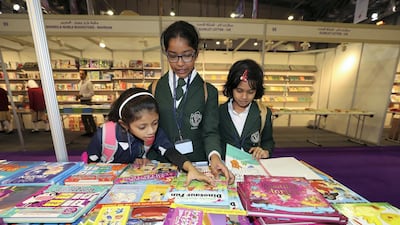“Reading is nourishment for the soul and mind.”
The words of Sheikh Mohammed bin Rashid, Vice President and Prime Minister of Dubai, before the launch of the Month of Reading 2021, serve as a reminder of the value of books in our society.
As Reading Month draws to a close at the end of March, its goals of establishing reading culture as a habit and raising a generation that is passionate about reading and knowledge should continue.
The theme of this month is My Family Reads. Here are some reasons why and how a reading family is what we should all aspire to be.
1. Reading strengthens your brain
As we read, we practise brain functions such as comprehension, fluency, sound awareness and visual and auditory processing.
Reading develops focus and concentration and helps to keep our memories strong.
Studies show that reading can reduce the risks of developing Alzheimer's and dementia later in life.
2. Reading develops vocabulary
Reading supports language acquisition in young children from the moment they are exposed to books.
As they develop and read a variety of genres, their vocabulary improves as they decipher the meaning of unknown words in context.
3. Reading increases your ability to empathise
The more books we read, the more people, lives and lifestyles we encounter.
Books can make us laugh, cry and fearfully turn a page as we anticipate a negative event for a protagonist.
Fiction transports us to worlds we have not experienced and reading events from another's perspective can influence how we relate to those around us.
Although we might think of it as a solitary activity, reading develops social skills and books can teach us the most appropriate ways to handle problems in society.
4. Reading develops creativity
Books open doors to places we can only dream about.
Because innovation is a key driving factor in the UAE’s economy, creativity and imagination are at the core of new ideas.
The more children read and learn, the more their divergent thinking will develop.
How to encourage reading in your family
Maryanne Wolf is a neuroscientist and author of Proust and Squid: The Story and Science of the Reading Brain.
This book explores the theory that the ability to read did not evolve naturally in human beings, unlike sight and vision.
Instead, the ability to read is a brain adaptation that developed after people learnt to communicate.
s Wolf stresses the importance of early and continuous exposure to language from infancy, to aid development of the reading brain.
She says that one of the best predictors of later reading skills is the amount of time young people are read to as a child.
Here are some ways to build on Wolf’s advice and incorporate reading as a habit beyond the Month of Reading.
1. Read daily
Reading aloud to babies helps to develop their vocabulary, communication skills and emotional intelligence.
Reading aloud as children get older develops a bond and a shared love of words and stories.
2. Read by example
Be a reading role model by showing your children that you value reading too. Over spring break, pack books for beach and pool days.
Reading by example will make your children want in on the fun too.
3. Use paperback books in addition to e-readers
Kindles are amazing for their practicality and ability to store thousands of books at your fingertips.
Research suggests that we absorb less information when reading on a screen, because screens tend to make our brains naturally skim and scan to look for the most important information.
Although your child may want to read on an iPad, ensure there are plenty of paperback options to get engrossed in too.
4. Expose your child to many forms of books
Explore many genres with your child to find all the different books that might interest them.
Comic books, non-fiction and wordless picture books can all spark curiosity in a child.
Listening to audio books can be another effective way to share stories.
Over the holidays, look up recipes and read them together until you both find something you want to bake.
Reading can take many forms – science experiments, match reports, menus. It does not matter what it is once it motivates your child.
As the Month of Reading ends, remember that the joy and knowledge from books will last a lifetime.
Claire Heylin is primary English lead teacher at Deira International School in Dubai.





















